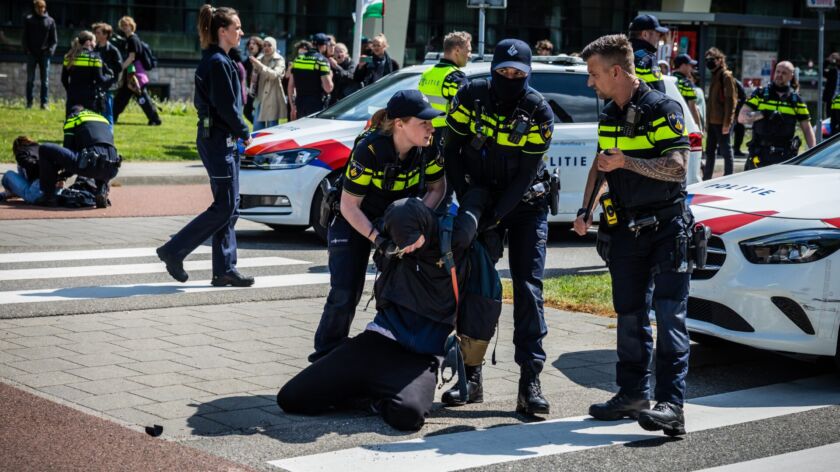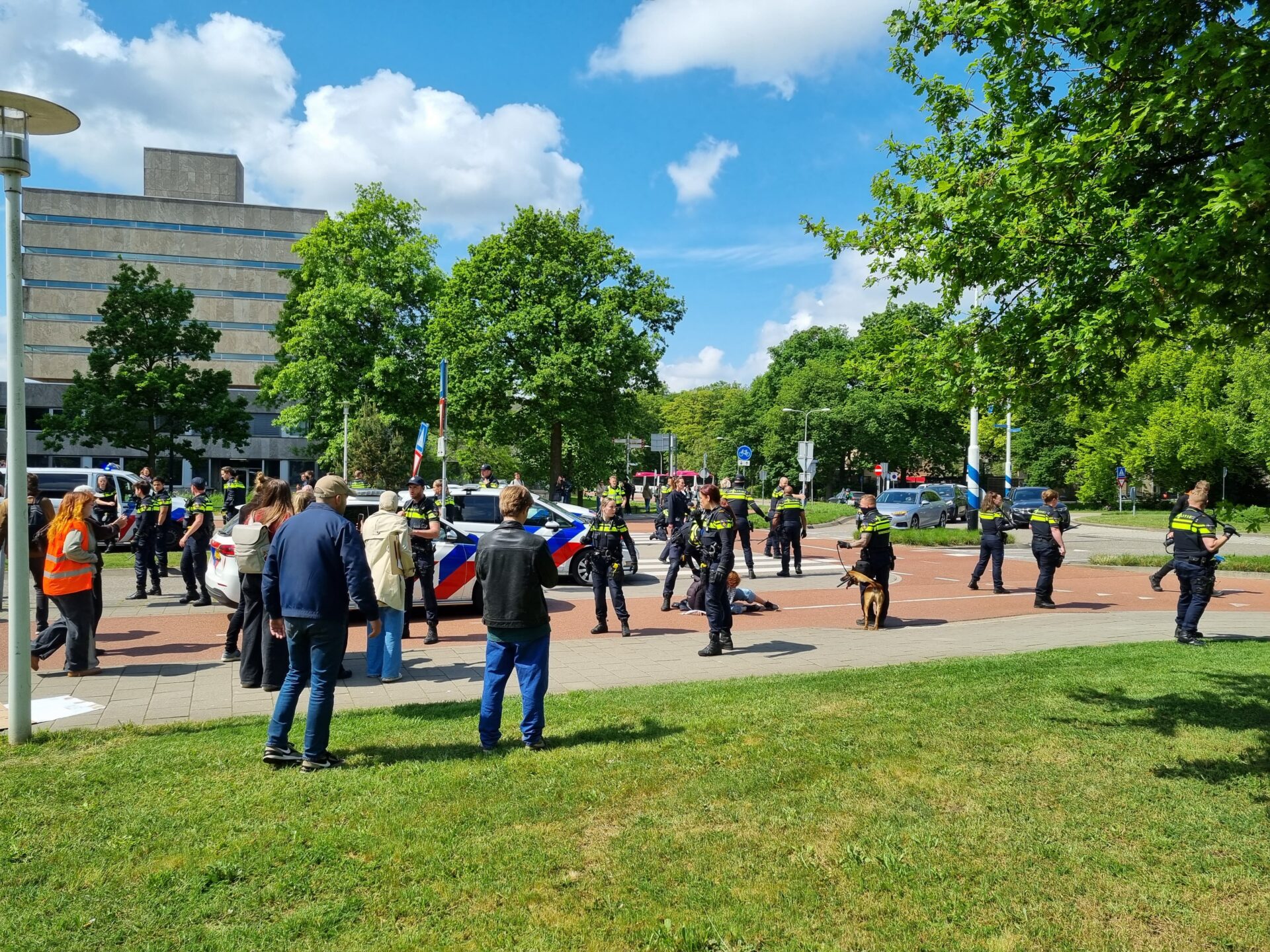External investigation into demonstration that culminated in dog bite: ‘We want to learn lessons from what happened’
-
 De politie verrichtte aanhoudingen na afloop van de demonstratie. Foto: Marcel Krijgsman
De politie verrichtte aanhoudingen na afloop van de demonstratie. Foto: Marcel Krijgsman
An out-of-control demonstration and subsequent police crackdown last spring have left deep wounds on campus. An external investigation is therefore under way to prevent a similar incident in the future. The university's two Ombuds Officers are monitoring the process. 'We want a clear factual account.'
7 May 2025 is etched into the minds of many Radboud University students and staff. That was the day when pro-Palestine demonstrators held yet another demonstration on campus to reinforce their demand that the university severs its ties with Israeli universities.
However, the demonstration got out of hand: shortly after a dozen activists had entered the Berchmanianum against the will of security guards, 14 police cars arrived on campus. A little later, Heyendaalseweg was the scene of a confrontation between police and activists, witnessed by dozens of passing staff and students. During that confrontation, other students were arrested. One student was also bitten on the leg by a police dog, an injury requiring several operations. Another activist sustained a broken kneecap due to the police response.
The events caused a stir on campus. Students from Student Union AKKU and a group of staff members demanded the resignation of the Executive Board. The Executive Board said it regretted what had happened, but refused to apologise for the police brutality on campus.
External consulting firm
To learn from the incident, Bureau Berenschot has been investigating the events of 7 May since mid-July. This was done at the request of the university’s two Ombuds Officers. ‘We received so many signals that could not be ignored’, says Ombuds Officer Job van Luyken. ‘It is a tremendously sensitive issue involving a lot of emotions. We therefore urged the Executive Board to commission this investigation.’
‘It is a tremendously sensitive issue involving a lot of emotions’
The Ombuds Officers say they have often been asked why they are not investigating the events themselves. ‘Due to the scope of the investigation and the time pressure, unfortunately this was not possible’, adds fellow Ombuds Officer Aukje Verstegen. ‘What’s more, we always need to leave time for other notifiers.’
Having other university staff conduct the investigation was not an option either. ‘There may be university students or staff on both sides of this conflict’, Verstegen explains. ‘If you then get university staff to do the investigation, you may be accused of not acting independently enough.’
Nevertheless, the choice of external consulting firm Berenschot – the exact cost of the investigation is not known – caused a stir on campus in times of austerity. ‘It’s not a cheap firm, but Berenschot also conducted a similar and very thorough investigation at the University of Amsterdam, and they produced some pretty tough conclusions’, says Van Luyken.
National Criminal Investigation Department
The subject of the investigation involves the events on that particular day on campus until the police response and after the police response. ‘We want a clear factual account of what happened before the police deployment’, Verstegen says. ‘Furthermore, we want to include what happened afterwards: did the Executive Board communicate in the right way? Did people get the right aftercare?’
The investigation does not therefore cover the actual police response, in which a student was bitten on the leg. ‘The moment that the police respond, there is nothing the Executive Board can do. At that point, the police choose their own strategy’, says Van Luyken. ‘Moreover, the deployment of the police dog is part of an investigation by the National Criminal Investigation Department. They just want to know what happened.’
The Ombuds Officers don’t know how many people have participated in the investigation so far. ‘The Berenschot consultants have indicated that they are satisfied with the turnout, and that both activists and people from the other side have reported to them’, says Verstegen. In addition to interviews, other information will be included in the investigation, such as CCTV footage, recordings and photographs.
Although the university only communicated about the investigation during the Vierdaagseweek, efforts were still made to reach all those involved as much as possible, Van Luyken explains. ‘We posted several messages for students in the newsletter and on Instagram. We also approached some activists to ask their supporters to take part in the investigation. Moreover, people can still apply until Monday, 8 September.’
No legal consequences
If all goes well, Ombuds Officers will receive a draft version of the report in the second half of September. ‘Then it’s up to us to come to a conclusion’, says Van Luyken. ‘Personally, for example, I like firm facts, not woolly language.’
‘People must feel free to honestly share their stories with us’
The report will then be shared with the Executive Board. But they should not influence or water down the investigation’, says Van Luyken. ‘If Berenschot concludes that mistakes were made, then that may be reported. As far as we are concerned, the report will then be published as soon as possible. The only thing to take into account: staff lower down in the organisation must be protected. Otherwise, you risk a witch hunt.’
Another thing that’s important to know, Verstegen adds: ‘There are no legal consequences attached to this investigation. People must feel free to honestly share their stories with us. The ultimate goal is to learn lessons from what happened in order to prevent another 7 May.’




